Selected Stoughton Music Highlights, 1762-1987
This information was compiled and written by musicologist, Roger Lee Hall
Earliest Singing Meetings
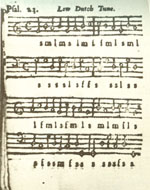
The first known singing meetings outside of a local church were held in Stoughton in 1762. There are 30 singing meetings listed at various locations in the diary of Elijah Dunbar (1740-1814), who eventually became the President of the Stoughton Musical Society in 1786. A list of all the singing meetings in 1762 and 1763 from Dunbar's original diaries are included on the multi-media DVD, "Dedication" - A Guide to Singing Meetings and Concerts in Stoughton, 1762-1992
Stoughton's First Town Tune
.jpg)
This tune titled "Stoughton" is from the New England composer, William Billings of Boston. The tune was printed in his first tune collection titled, "The New-England Psalm Singer," published in Boston in 1770 -- THE FIRST COLLECTION OF MUSIC BY ONE AMERICAN COMPOSER. The reason he titled it "Stoughton" was due to the fact that he had relatives living in the Stoughton area. He came to town four years later to teach a singing school.
In 1980, musicologist and composer, Roger Hall, added a text by Dr. Isaac Watts (1674-1748) to this wordless Billings tune.
For the complete text -- click here
The William Billings Singing School
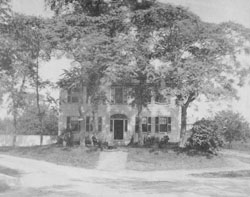
Read about the only known singing school in early America with all the pupils listed taught in 1774 by William Billings, the best known New England composer in 18th century America. His Stoughton singing school had 49 pupils, consisting of young males and females, and one of them later became a composer himself, Jacob French.
In that singing school, Billings also met his future wife, Lucy Swan, and they lived in Boston.
To see the list of 49 pupils in the 1774 singing school -- go here
See this newest publication!
This book, originally published in 2000, has been revised and expanded with more information including about the Billings singing school:
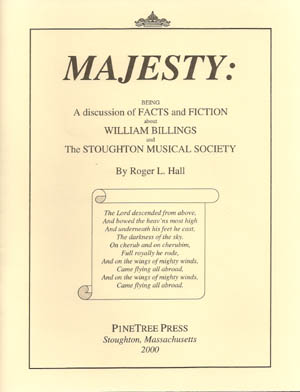
The Old Stoughton Musical Society (1786 - Today)
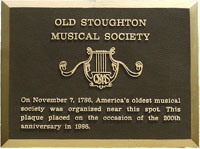
This plaque is located at the entrance of the Stoughton Historical Society building in Stoughton Square and reads:
"On November 7, 1786, America's oldest musical society was organized near this spot. This plaque placed on the occasion of its 200th anniversary in 1986."
This society was originally known as the Stoughton Musical Society (SMS) and had its first meeting at Robert Capen's house at the corner of Park and Seaver Streets. Many of the first members were from what is now Canton, Massachusetts, including their first President and Song Leader, Elijah Dunbar, who served as President until 1808. He was a graduate of Harvard College and active in many duties, including naming his Town of Canton, when it was incorporated in 1797.
Vice-President was Capt. Samuel Talbot, who later served as as their second President from 1808 to 1818. The first Secretary was Lt. Samuel Capen, serving from 1786 to 1800. For the first few years there were two Treasurers: Joseph Smith, 4th and Andrew Capen.
At first it was exclusively a men's singing society with an admission fee of 2 shillings. Members were also expected to pay for their "spirits" (drinks) and any other expenses. Later, it was incorrectly stated that the payment of today's equivalent of 50 cents was a lifetime membership, but that was supposed to be just a fee to join and membership dues would be possible also.
Then in 1844, "it was voted that ladies be invited to sing with the Society," after the serving of alcohol had been abolished.
This musical society added the prefix "Old" when they were officially incorporated in the Commonwealth of Massachusetts in 1908. They accepted singers from all the surrounding towns, including Avon, Braintree, Bridgewater, Brockton, Canton, Randolph and other locales.
Two hundred years later to the date, on November 7, 1986, the OSMS Bicentennial Concert was held at Stoughton High School. The same major choral work was performed as at the Centennial Concert in 1886 -- Franz Joseph Haydn's The Creation, for soloists, chorus and orchestra. Also performed in the concert was a tune titled "Stoughton" by William Billings, in a new edition by Roger Hall with an 18th century text by Dr. Isaac Watts.
In 1994, thanks to the efforts of musicologist, Roger Hall, this choral society was listed in The Guinness Book of Records.
Mr. Hall also submitted the information to the Chase's Calendar of Events, a national directory, which had this entry:
"OLD STOUGHTON MUSICAL SOCIETY: ANNIVERSARY. Nov. 7, 1786. Founded at Stoughton, MA, the Stoughton Musical Society is the oldest choral society in the United States."
To see the Official OSMS Site -- click here
First Singing Contest

Read about the contest between two Massachusetts choruses, included selected voices from the Stoughton Musical Society at
America's First Singing Contest
The Musical Society in Stoughton (1802-1982)

A second choral society was organized in Stoughton on January 1, 1802.
The only difference between the two societies was that only Stoughton residents could join this singing group. Many of them also belonged to the older Stoughton Musical Society. For example, the first President of this choral society was Capt. Samuel Talbot, who also served at the same time as Vice President of the Stoughton Musical Society.
Samuel Talbot served as President of the Musical Society in Stoughton from 1802 to 1808. The first Vice President was Robert Swan, who served from 1806 to 1808. First Secretary was Abram Capen (1802-1806), and First Treasurer was John Dickerman Jr. (1802-1806).

One of their last officers, Frank Reynolds, had the original sign board painted over with the incorrect date of 1762 substituted for the date of 1802, bringing great dishonor to him for tampering with an artifact of history. But his dirty deed didn't go unpunished. After years of incorrectly claiming they were the "oldest choral society in America," The Musical Society in Stoughton (MSIS) continued to lose members until they finally dwindled down to only a few and were disbanded in 1982, with their remaining assets given to the Old Stoughton Musical Society, who actually WAS the oldest singing society in town.
There are still traces of the wrong date for the Musical Society in Stoughton, such as in the Pilgrim Monument at Provincetown, Massachusetts, which may be "set in stone" but is still incorrect when it states the Musical Society in Stoughton began in 1762, instead of 1802. The 1786 date s correct for the Old Stoughton Musical Society. Actually both musical societies had singers who were attending informal singing meetings in 1762 in Stoughton but no musical society had yet been formed.
The Centennial Celebration in 1886

The Centennial observance of The Stoughton Musical Society took place with Gov. George D. Robinson and Lt. Gov. Oliver Ames in attendance.
It was held on June 9, 1886 with an evening concert at Stoughton Town Hall:
The complete program for the Centennial on June 9:
Morning Exercises (10:00 a.m.)
1. Overture: The Magic Flute - Mozart
2. Hymn to the tune of "Old Hundred"
3. Prayer by Rev. E.H. Capen, D.D., President Tufts College.
4. Words of welcome by the SMS President, Winslow Battles.
5. Historical address by Hon. Samuel B. Noyes.
6. Centennial Hymn - written by Dexter Smith, Esq.
Evening Exercises (7:30 p.m.)
Oratorio: The Creation - F.J. Haydn
Miss Elene Buffington Kehew, soprano;
Mr. George J. Parker, tenor;
Mr. Clarence E. Hay, bass.
Orchestra of the Society, Mr. E.A. Jones, leader,
Mr. H.L. West, accompanist.
Conductor: Mr. Hiram Wilde,
Assistant Conductor: Mr. George N. Spear.
Tickets to Concert, 50 and 75 cents.
Admission to the morning exercises alone -- 25 cents
Stoughton's Second Town Tune (1886)

"OLD STOUGHTON" - In 1886, Edwin Arthur Jones composed a special commemorative piece for the Musical Society in Stoughton. This tune was composed in the 18th century New England fugal style. A copy the sheet music is included in the pamphlet, E.A. Jones: His Life and Music. A recording of "OLD STOUGHTON" is
on the
AMRC CD 0047: "Dedication - The Stoughton Harmony."
Benefit Concert for Johnstown Flood Sufferers in 1889
Held at Stoughton Town Hall beginning at 8:00 p.m. on June 14 to raise money
for the victims of the horrific flood in Johnstown, Pennsylvania on May 31,1889.
The evening program included these music selections:
"Prelude for Horn and Orchestra" - E.M. Toomey, horn soloist,
Stoughton Dramatic Orchestra
"Ave Maria" (Winkler)- sung by Evie A. Drake
"The heart bowed down" (Balfe)- sung by Rev. C.E. Tenney
"Gondoliers" (Moszkowski) - piano solo by Minnie W. Brett
"Meditation" (Chenery) - sung by William Atherton
"Vacant Chair" (George
F. Root-Henry S. Washburn) -
sung by Mrs. Cook, Mrs. Lunt, Rev. C.R. Tenney, Mr. S.E. Capen
"Marguerite" (Gounod) - sung by May A. Thayer
The World's Exposition Concerts in Chicago, Illinois, 1893
In August of 1893, the Stoughton Musical Society was the only invited chorus to perform early New England music at the World's Columbian Exposition in Chicago. The man mostly responsible for arranging these concerts was Stoughton composer and violinist, E.A. Jones. Two concerts were given on August 14 and 15, with several thousand people in the audience, more than attended the classical symphony concerts.
For a complete list of the music performed by the Stoughton Musical Society click this link:
World's Columbian Exposition Concerts in 1893
Old Stoughton Musical Society Incorporation

Constitution Adopted at Randolph, Massachusetts
January 1, 1908
Article 1. Object
The object of this Society shall be as heretofore and always, the preservation, cultivation, and practice of the music of the earlier native composers, together with general musical and antiquarian activity.
Article II. Meetings
Article III. Officers
Article IV. Duties of Officers
Article V. Vice President
Article VI. Clerk
Article VII. Trustees
Article VIII. Directors
Article IX. Chorister [Conductor]
Article X. The Vice Chorister
Article XI. Membership
Article XII. Amendments
This Constitution has been changed many times since its approval in 1908, mostly to amend the articles.
.
Two Fall Music Festivals
"Musick in Old New England"
Old Stoughton Musical Society's First Fall Music Festival was held in Bridgewater, Massachusetts on October 14-15, 1978.
Featuring choral music by William Billings, Bartholomew Brown, Samuel Capen, Lewis Edson, Jeremiah Ingalls, Edwin Arthur Jones, Nahum Mitchell, and organ music by James Hewitt, Oliver Shaw and others. The Old Stoughton Musical Society Chorus, William J. Childs, director. Richard Hill, organist.
A CD is available from the radio program narrated by Festival Chairman, Roger Hall titled: "Chester" - Music in Old New England, 1778-1878"
Read about it at -- Stoughton Music Heritage Series
"Musick in Old Boston"
(In celebration of Jubilee 350 for City of Boston)
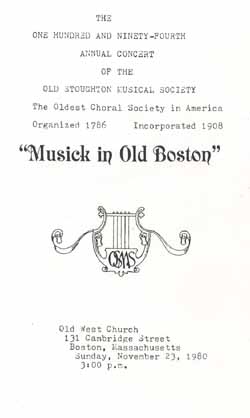
Second Fall Music Festival:
Boston, November 22-23, 1980
Stoughton Town Hall Centennial Concert in 1981

This concert honoring the centennial of Stoughton Town Hall was performed by the Old Stoughton Musical Society, conducted by Roger Hall, on November 22, 1981.
A special banner with the Stoughton Town Seal was designed for the occasion by artist, Mildred Wilson.
All the music was by American composers, including: William Billings, Supply Belcher, Samuel Barber and Randall Thompson.
Some of the pieces in the concert were by local composers, including several choruses by Edwin Arthur Jones and an anti-war song, "Peace,"
set to a poem written in 1814 by a Stoughton young girl, Esther Talbot.
This is the first verse of her poem:
Come, gentle Peace, with smiling ray,
Beam on our land a cloudless day;
Beneath thy influence serene,
The olive wears immortal green.
The poem was set to music by Roger Hall and received its Premiere Performance in this 1981 concert,
with soloist Karen Pritchard and The Old Stoughton Musical Society Chorus.
Read more about this song from the Boston Globe newspaper article at -- Peace Poem 1814.
Most Performed Early New England Tunes
The custom at Stoughton Musical Society meetings was to sing some of the same tunes in their concerts.
As compiled by musicologist, Roger Hall, these are the top ten most performed tunes in Stoughton Musical Society concerts between 1882 and 1982:
No. 1: NEW JERUSALEM - Jeremiah Ingalls, 1764-1838 = 76 performances
No. 2: MAJESTY - William Billings = 75 performances
No. 3:
CHESTER - William Billings, 1746-1800 = 74 performances
No. 4: VICTORY - Daniel Read, 1757-1836 = 66 performances
No. 5: TURNER - Abraham Maxim, 1773-1829 = 64 performances
No. 6: INVITATION - Jacob Kimball, 1761-1826 = 64 performances
No. 7: ANTHEM FOR EASTER - William Billings = 54 performances
No. 8: CONFIDENCE - Oliver Holden, 1765-1844 = 42 performances
No. 9: ODE ON SCIENCE - Jezaniah Sumner, 1754-1836 = 42 performances
No. 10: NEW BETHLEHEM - Edward French, 1761-1845 = 39 performances
Source: Singing Stoughton: Selected Highlights from America's Oldest Choral Society by Roger Hall (1985)
Most Performed American Composers
(1976-1986)
This listing is based on the 16 concerts presented by The Old Stoughton Musical Society
between the 250th anniversary of the Town of Stoughton and the
200th anniversary of the Old Stoughton Musical Society in 1986:
No. 01: William Billings, 1746-1800 = 34 performances
No. 02:
Edwin Arthur Jones, 1853-1911 = 15 performances
No. 03:
Oliver Shaw, 1779-1848 = 15 performances
No. 04: Stephen C. Foster, 1826-1864 = 12 performances
No. 05: George W. Chadwick, 1854-1931 = 9 performances
No. 06: Charles E. Ives, 1874-1954 = 8 performances
No. 07: Jeremiah Ingalls, 1764-1838 = 6 performances
No. 08: Jacob French, 1754-1817 = 5 performances
No. 09: Lowell Mason, 1792-1872 = 5 performances
No. 10: Charles T. Griffes, 1884-1920 = 4 performances
Source: Music in Stoughton: A Brief History (1989)
by Roger Hall
OSMS Bicentennial Anniversary in 1986

November 7, 1986 was declared as "Old Stoughton Musical Society Day" in the Commonwealth of Massachusetts by order of Governor Michael S. Dukakis.
Gov. Dukakis (seated in the center):
From left to right:
State Senator William R. Keating;
O.S.M.S. President David M. Benjamin;
State Representative Marjorie A. Clapprood;
O.S.M.S.
Treasurer Joseph M. Klements;
O.S.M.S. Vice President and Bicentennial Chairman, Roger L. Hall
The Old Stoughton Musical Society Bicentennial Season included special exhibits at Harvard University, in Lexington and Stoughton, all prepared by Bicentennial Chairman, Roger Hall.
There were four concerts given during 1986:
The first one was given on April 20 in North Easton, Massachusetts, under the direction of Earl Eyrich. It featured the World Premiere performance of the hymn tune, STOUGHTON, by William Billings, edited by Roger Hall, who added a hymn text by Dr. Isaac Watts which was popular in 18th century New England.
Also, there was a special exhibit in the music library of Harvard University and two concerts given at the Museum of Our National Heritage in Lexington, Massachusetts:
The first concert in Lexington was presented in October and titled: "Two Centuries of Piano Music in New England," featuring pianist David Hagan performing works by Charles Ives, Edwin Arthur Jones, Roger Hall and other composers.
The following month a second concert was presented: "Two Centuries of Choral Music in New England," with the Old Stoughton Musical Society Chorus, directed by Earl Eyrich, performing music by William Billings, Jacob French, Oliver Shaw, Edwin A. Jones, George W. Chadwick, and Roger Hall, who composed an 18th century style fuging tune titled, DEDICATION, based on words printed in the 1794 tune book of William Billings.
The fourth concert that year was the official Bicentennial Concert held at Stoughton High School exactly two hundred years later on November 7, 1986. The Billings hymn STOUGHTON was again performed and the featured work was Franz Joseph Haydn's oratorio, The Creation, for soloists, chorus and orchestra, conducted by Earl Eyrich. This was the same work that had been performed in the 1886 concert of the Old Stoughton Musical Society. The Bicentennial Commemorative program booklet contains congratulatory letters from President Ronald Reagan, an entry in The Congressional Record by Hon. Joseph Moakley, and concert notes by Earl Eyrich and Roger Hall.
Also on November 7, Roger Hall was a guest along with William Billings biographer, David McKay, on the popular Boston radio program, "Morning Pro Musica," on WGBH-FM and hosted by Robert J. Lurtsema. There were several Billings tunes played on the program. A portion of this radio interview is available on the CD,
The Best of William Billings (AMRC 0001).
In honor of this 200th anniversary, Roger Hall wrote a special Bicentennial Hymn based on the familiar psalm tune, "Old Hundred." This hymn text was included in the Bicentennial Concert Commemorative Program Booklet.

The 60 member chorus of The Old Stoughton Musical Society on stage at
Stoughton High School for the Bicentennial Concert on November 7, 1986
In fond memory of a past music director for the
Old Stoughton Musical Society,
Earl E. Eyrich, 1944-2001
Also In fond memory of these past OSMS musicians:
Sally MacKerron Worthen, 1947-2011
(soloist
and Bicentennial Committee Member)
David M. Benjamin, 1921-2008
(soloist and Past OSMS President)
Richard W. Hill, 1938-2020
(organist and pianist)
Stoughton's Third Town Tune
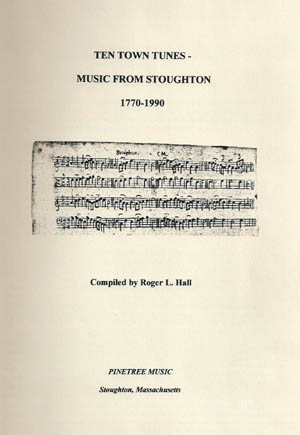
Read about the town tune originally titled, "DEDICATION,"
composed by Roger Hall and
included in the sheet music collection,
TEN TOWN TUNES: MUSIC IN STOUGHTON -- click here
The Stoughton Musical Society
Bicentennial in 1987
The bicentennial of the oldest constitution of any musical society in the United States took place in October of 1987.
The Stoughton Musical Society was written in October of 1787, just a few weeks after the U.S. Constitution was written. Here is a portion of the opening statement or Preamble to this 1787 Constitution :
And as the powers of harmonious music are most admirably calculated to humanize the ferocious passions, to increase the various emotions of the mind, the different degrees of sensibility and all the feelings of the heart, that not only the sense of hearing receives the highest gratification from sounds the most congenial to the organs of man, but we are made partakers at one and the same time of instruction and delight in viewing the noblest work of the Almighty, put in motion to answer the noblest ends... We, therefore, esteem it our duty to study to promote that harmony which is pleasing to our Maker and so delightful to ourselves. Stimulated with these salutary and laudable motives, we, whose names are underwritten, form ourselves in a society by the name of the Stoughton Musical Society, for the implied purpose of practicing vocal music....
The bicentennial program including an original play about the writing of the Stoughton Musical Society's Constitution is titled "Old Stoughton and The Grand Constitution," and the video from the 1987 program is available on this DVD release:
"Dedication" -
Singing in Stoughton, 1762-1992
Harmony Revered:
Old Stoughton vs. Sacred Harp Singing
.jpg)
Two of the oldest amateur singing traditions of religious or harmony music in the U.S. are the two musical societies in Stoughton, and the Sacred Harp singing in the South, especially in Alabama, Georgia and Mississippi.
Of these, Stoughton is the oldest, performing choral music consisting of plain tunes, fuging tunes, set pieces and anthems. Also, this music has been supplemented with performances of larger choral works, such as cantatas and oratorios -- both types composed by an unjustly forgotten 19th century Stoughton composer, Edwin Arthur Jones.
There were two music collections published by the Stoughton Musical Society, the first in 1829 and the second one in 1878, which had tunes by Stoughton-born composers, such as Supply Belcher, Jacob French, and his brother, Edward French.

In 1980, The Stoughton Musical Society's Centennial Collection of Sacred Music (Ditson & Co., 1878), was reprinted with an Introduction and New Index by Roger Hall (New York: Da Capo Press, 304 pages). There are about 160 tunes in the collection, most of them by New England composers and some edited music by European composers (Haydn, Mozart, Naumann, Stephenson, Tans'ur). There are more New England tunes in this Stoughton collection than in most other tune books of the 19th century, including The Sacred Harp.
Just to give an example, here are the number of tunes by William Billings in these collections:
The Sacred Harp (1844/ revision, 1991) = 14 tunes
The Stoughton Centennial Collection (1878/ reprint, 1980) = 28 tunes
Thus, contrary to common belief, 18th century tunes did not disappear during the late 19th century and early 20th centuries in the North, at least in Stoughton and surrounding towns.
Unfortunately, this fact is forgotten or not known by scholars and those who sing the New England music from The Sacred Harp, and other contemporary tune books, like The Northern Harmony (1998) and The Norumbega Harmony (2003).
They all fail to mention the important singing tradition in Stoughton that has been continuous since the 1760s.
The only event ever mentioned about Stoughton is the famous singing school taught there by William Billings in 1774. It is incorrect to say that Billings actually organized the Stoughton Musical Society, though he was greatly admired and five of the pupils in his singing school later joined the musical society when it was organized in 1786. Much more has happened in Stoughton since that time.
Also, the singing traditions in the North and South are not the same.
The Sacred Harp (or Shape-note) Tradition features a different singing style, with more emphasis placed on lung power and less on subtle singing. It is a much better known tradition than the one from Stoughton, and much appreciated, as it should be.
The Stoughton Tradition has been a more cultivated one. Like the Sacred Harp Tradition, the singers are not usually professional musicians. In the past, most of the chorus was made up of singers from many nearby towns in the Stoughton area. Their concerts have often included many of the same people who meet to enjoy the singing experience. It has remained the longest such tradition but unfortunately seems to have lost its way in the present day, with far fewer good singers and a change of repertoire away from the singing of early New England tunes.
For over two centuries, early New England choral music was continued by the Old Stoughton Musical Society, and it deserves to be remembered for that achievement.
Much more information is provided in this book by Roger L. Hall:
"DEDICATION" - A Guide to Singing Meetings and Concerts in Stoughton, 1762-1992
Ten Stoughton Choral Composers
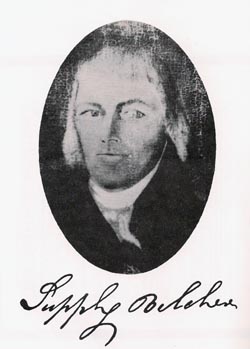
Portrait and signature of Supply Belcher from
A History of Farmington, Franklin County, Maine
A research article written by Roger Lee Hall titled,
"The Handel of Maine:
The Musical Life of Supply Belcher"
included on the multimedia DVD
"DEDICATION" - Singing in Stoughton, 1762-1992
18th century Stoughton composers
There were at least four composers born in 18th century Stoughton, and two of them Supply Belcher and Jacob French, became better known when they moved to other New England states.
Belcher became a prominent judge in what is now Maine and French taught singing in Connecticut. Both produced music collections (or "tunebooks").
Belcher published only one tunebook, The Harmony of Maine (Boston, 1794), which may have tunes he composed while living in Canton, Massachusetts.
Jacob French published three tunebooks: The New American Melody (1789); The Psalmodist's Companion (1793), and The Harmony of Harmony (1802).
The four Stoughton-born composers from the 18th century are:
- Supply Belcher (born: Stoughton, 1751/
died: Farmington, Maine, 1836)
- Samuel Capen (born: Stoughton, 1745 /
died: Canton, Massachusetts, 1809)
- Edward French (born: Stoughton, 1761 /
died: Sharon, Massachusetts, 1845)
- Jacob French (born: Stoughton, 1754 /
died: Simsbury, Connecticut, 1817)

19th century Stoughton composers
- Alanson Belcher (born: 1810/died: Stoughton, 1900)
- Edwin Arthur Jones (born: 1853/died: Stoughton, 1911)

Stoughton Square in 1910
20th century composers
- Laura Shafer Gebhardt (born: 1885/died Stoughton, 1959)
- F. William Kempf (born: 1901/ died: Stoughton, 1950)
- Frank W. Reynolds (born: 1887/died: Stoughton, 1975)
- Roger L. Hall (born: 1942)
Sample Stoughton Music Programs
2012
Civil War Event at Faxon Park in Stoughton
April 21, 2012


One of the events was a display with music books and CDs prepared by Roger Hall.
He also played what is believed to be the first modern day concert performance of the original version
of "Battle Hymn of the Republic" written during the Civil War and
sung in Boston by the Old Stoughton Musical Society in 1980, conducted by Mr. Hall.
This version is included on this CD--

Click on this link for more information:
Glory, Hallelujah - Songs and Hymns of the Civil War Era
2011
The year 2011 marked the centennial of the death of Stoughton composer and town benefactor, Edwin Arthur Jones (1853-1911). In addition to his musical activities, Jones also designed the Stoughton Town Seal, which includes a music symbol.
On Sunday, March 13, at the Stoughton Historical Society, musicologist and Jones biographer, Roger Hall, presented several of his DVDs to Dwight MacKerron, Historical Society President. Roger also gave a brief slide show about the music of E.A. Jones at their monthly meeting.
E.A. Jones and Isabella Stewart Gardner:
 On April 28, Roger Hall discussed and played a string quartet by E.A. Jones which was first performed at the home of Isabella Stewart Gardner in Boston in 1889. This discussion was part of the Stoughton Reads Together series about the book, The Gardner Heist: The True Story of the World's Largest Unsolved Art Heist by Ulrich Boser.
On April 28, Roger Hall discussed and played a string quartet by E.A. Jones which was first performed at the home of Isabella Stewart Gardner in Boston in 1889. This discussion was part of the Stoughton Reads Together series about the book, The Gardner Heist: The True Story of the World's Largest Unsolved Art Heist by Ulrich Boser.
Read more at this link: Edwin Arthur Jones
2010
Christmas "Sings"
2010 marked the 250th anniversary year of what is believed to be the first singing school held in New England.
According to Daniel T.V. Huntoon, Elijah Dunbar, a recent Harvard College graduate, returned to his hometown of Stoughton and taught a singing school there in 1760. More singing meetings were held in the years that followed and by 1774, the Boston composer, William Billings, the Father of American Choral Music, came to town to teach another singing school.
One of the early New England Christmas carols was by Edward French in 1799...
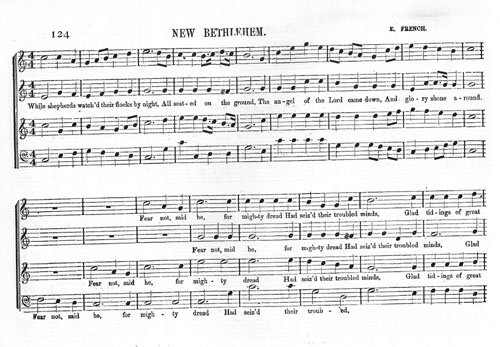
To help celebrate this 250th anniversary, Roger Hall, Director of the New England Music Archive, presented a music program for the Randolph Historical Society, in the Jonathan Belcher House, 360 North Main St., Randolph, on Wednesday, Dec. 8.
The program was titled, "The Christmas Sings in Randolph."
He read excerpts from his new latest publication on DVD: "OLD STOUGHTON" – Singing Meetings and Concerts and focused on the Christmas Day concerts held in Randolph, and also compared them to a story by the popular 19th century writer, Mary Wilkins Freeman, who wrote about a Christmas sing in Randolph, published in The Ladies’ Home Journal in 1897.
Here are a few of the old New England tunes performed in an 1896 Christmas Sing in Randolph:
INVITATION -- Jacob Kimball
VICTORY -- Daniel Read
MAJESTY -- William Billings
NEW BETHLEHEM -- Edward French
NEW JERUSALEM -- Jeremiah Ingalls
Some of this music in the Randolph program is included on a CD, Christmas Music From New England. It includes many carols from New England, including popular ones like “O Little Town of Bethlehem” and “Joy to the World.”
Patriotic Songs in Early Canton
On July 11, Roger Hall, Director of the New England Music Archive, presented a program titled,"Music in Early Canton" at the Canton Historical Society.
His program featured music by local composers, plus patriotic songs from a CD recorded in Canton titled, "A Toast - Music of George Washington's Time" including these patriotic songs:
Father and I Went Down To Camp
(tune: Yankee Doodle)
Ode To President George Washington
(tune: God Save The King)
Books and Articles
Flynn, John E.
Beyond the Blew-Hills: A Short History of the Town of Stoughton, Massachusetts. Stoughton: Stoughton Historical Society, 1976.
Originally published in 1956.
Hall, Roger L.
- E.A. Jones: His Life and Music, 1984.
- "Elijah Dunbar: Canton's First Music Man,"
Stoughton Journal newspaper, February 20, 1997.
- "When will Stoughton get back on the musical map?"
Stoughton Journal newspaper, December 11, 1997.
- MAJESTY: William Billings and The Stoughton Musical Society,
Stoughton: PineTree Press, 2000.
- Music in Early Canton: Historical Notes and Music.
Stoughton: PineTree Press,1997.
- Music in Stoughton: A Brief Survey, 1989.
- New England Songster: Songs written between 1768 and 1988,
PineTree Press, 1997.
- OLD STOUGHTON: Singing Meetings and Concerts
Stoughton: PineTree Press, 2010. Multimedia DVD.
- SINGING STOUGHTON: Selected Highlights from America's Oldest Choral Society, 1985.
- "Stoughton Choral Society - America's Oldest - Turns 225,"
Online: Wicked Local News,October 28, 2011, also The Stoughton Journal newspaper.
- "Stoughton's Singing History,"
Online:
Stoughton Patch news site,
December 11, 2012.
- The Stoughton Songster: Music Performed between 1980 and 1990.
Stoughton: PineTree Press, 1991.
- Ten Town Tunes - Music From Stoughton, 1770-1990.
Stoughton: PineTree Music, 1998.
- The Stoughton Musical Society's Centennial Collection of Sacred Music.
Boston: Ditson & Company, 1878/ Reprint, DaCapo Press, 1980.
Introduction and New Indexes by Roger Hall.
"This reprint is a most welcome offering for anyone interested in examining our native musical heritage, particularly those concerned with the choral tradition... This volume should furnish hours of pleasant singing -- useful in the church, concert hall and the home." - review by David P. McKay in The Hymn, 1982
- "William Billings' songs to be remembered, Celebration set Oct. 6 at Boston Common,"
Stoughton Journal, September 26, 1996.
Huntoon, Daniel T.V.
History of Canton, Norfolk County, Massachusetts, Cambridge, MA: John Wilson and Son, 1893. Includes a chapter on music in Canton and Stoughton.
Jones, Mary (Swan) and Frank W. Reynolds
History of the Musical Society in Stoughton, undated history [sub-heading "Formed in 1762" is incorrect. This society was formed officially on January 1, 1802.]
Ritterband, Vicki
"Choral group gets credit as nation's oldest"
The Patriot Ledger newspaper, January 8/9, 1994.
Story about Old Stoughton Musical Society being listed in The Guinness Book of World Records.
Standish, Lemuel, editor
The Old Stoughton Musical Society: An Historical and Informative Record of the Oldest Choral Society in America. Stoughton, Massachusetts, 1929.
Music Collections
.
Contents:
PART ONE: William Billings - His Life and Music
1. Family Tree
2. Parents
3. Wife and Children
4. Occupations
5. Revolutionary Patriot
6. Singing Master and Composer
PART TWO: William Billings and Old Stoughton
7. The Singing School
8. The Stoughton Musical Society
9. First Tunebook
10. Second Tunebook
11. Chicago World's Exposition Concerts
12. Billings Tunes in Stoughton Concerts (1876-1986)
Notes
Bibliography
Discography
MUSIC SUPPLEMENT:

THE PLEASURES OF VARIETY (Text: William Billings/
Music: Roger Hall)
COME LET US SING (Text: William Billings/ Music: Roger Hall)
MAJESTY (music by William Billings, 1778)
STOUGHTON (music by William Billings, 1770, edited by Roger Hall)
Music Activities in Stoughton (1980-1999)
2012
Civil War Event at Faxon Park in Stoughton
April 21, 2012


One of the events was a display with music books and CDs prepared by Roger Hall.
He also played what is believed to be the first modern day concert performance of the original version
of "Battle Hymn of the Republic" written during the Civil War and
sung in Boston by the Old Stoughton Musical Society in 1980, conducted by Mr. Hall.
This version is included on this CD...

Click on this link for more information:
Glory, Hallelujah - Songs and Hymns of the Civil War Era
.
A series of 4 CDs from concerts and festivals
No. 1: "Chester" - Music in Old New England, 1778 - 1878 (radio documentary)
Radio broadcast with narration by Roger Hall of highlights from the Old Stoughton Musical Society's
First Fall Music Festival in Bridgewater, Massachusetts on October 14-15, 1978.
Featuring choral music by William Billings, Bartholomew Brown, Samuel Capen, Lewis Edson, Jeremiah Ingalls, Edwin Arthur Jones, Nahum Mitchell, and organ music by James Hewitt, Oliver Shaw and others.
The Old Stoughton Musical Society Chorus, William J. Childs, director.
Richard Hill, organist.
No. 2: "Peace" - A Dedication Concert
(In Celebration of the 100th Anniversary of
Stoughton Town Hall)
Read more about this concert presented by the Old Stoughton Musical Society, conducted by Roger Hall, on November 22, 1981 --
Click this link
No. 3: "THE HEAVENLY VISION" - Old Stoughton Music Sampler
A survey of music covering two centuries from the 1770s to 1980s, performed by the Old Stoughton Musical Society. Including music by: Supply Belcher, William Billings, Samuel Capen, Stephen Foster, Edward and Jacob French, Roger Hall, Oliver Holden, Jeremiah Ingalls, Charles Ives, Edwin Arthur Jones, and Daniel Read.
No. 4: "DEDICATION" - The Stoughton Harmony
A selection of choral music by New England composers from the 18th, 19th and 20th centuries. These are the music titles:
1. The Star Spangled Banner - 19th century choral arrangement
Music By William Billings (1746-1800)
2. STOUGHTON - 1770 (ed. by Roger Hall) - First Performance, 1986
3. SHARON - 1778 (ed. by Roger Hall) - First Performance, 1980
4. BOSTON - 1778
5. CHESTER - 1778 & 1786 (with Paul Revere bell)
6. MAJESTY - 1778
7. THANKSGIVING HYMN (tune: KITTERY)
8. DAVID'S LAMENTATION - 1778
Music From Federalist Era
9. CONSTITUTION SONG (1788)
10. ODE TO PRESIDENT GEORGE WASINGTON (1789)
- excerpt from historical play celebrating U.S. Constitution (1987)
11. MOUNT VERNON - Oliver Holden, 1799
Music From New England Singing Masters
12. CORONATION - Oliver Holden (1793)
13. VICTORY - Daniel Read (1793)
14. NEW JERUSALEM - Jeremiah Ingalls, 1796
15. NORTHFIELD - Jeremiah Ingalls
16. NEW BETHLEHEM - Edward French, 1799
17. THE DOVE - Samuel Capen, 1805
Civil War Years:
18. JOHN BROWN and BATTLE HYMN OF THE REPUBLIC (1861-62)
19. GIVE US THIS DAY - Stephen Foster, 1863
The Gilded Age:
20. SONS AND DAUGHTERS OF THE PILGRIMS - Temperance Hymn
21. OLD STOUGHTON - Edwin Arthur Jones, 1886
22. THE LORD IS KING - Edwin Arthur Jones, 1890
23. EASTER CAROL - Charles Ives, 1892
20th Century:
24. O, BOSTON - arr. by Roger Hall, 1980- First Performance for Boston's 350th anniversary
25. DEDICATION - Roger Hall, 1986 - First performance in OSMS 200th Anniversary Season
26. PEACE - Roger Hall - First Performance, 1990 - "A Stoughton Musicfest"
27. SONG OF THE OLD FOLKS (tune: AULD LANG SYNE)
Each of these four CDs are available for $15.00 or $48 for all four CDs,
and
including Free shipping (USA orders only).
To order one or more of the special produced CDs -- click here
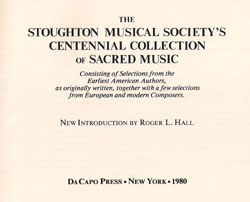
Stoughton Music Heritage Series

Would you like to schedule a program about
the oldest choral society in the USA or some other music program?
See this link for Lectures and Workshops
.
Musicologist Makes Music
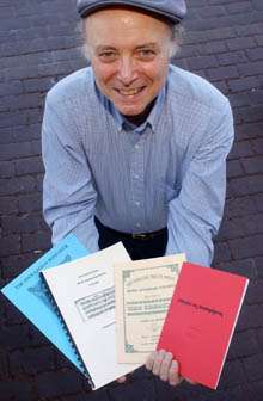
Thanks to the efforts of musicologist, Roger Hall, the Old Stoughton Musical Society (OSMS) was listed as America's oldest choral society in The Guinness Book of Records and also in Chase's Calendar of Events -
a national directory.
Roger served as the first Chairman of the Stoughton Arts Council from 1980 to 1984, and he was a member of the Massachusetts Arts Advisory Committee during the 1980s.
Between 1979 and 1987, he was the Historian and Vice-President of the Old Stoughton Musical Society.
He also organized several music festivals:
"Musick in Old New England" (1978)
"Musick in Old Boston" (1980)
He was the Chairman of the Old Stoughton Musical Society Bicentennial Committee in 1986 and scheduled concerts in Lexington, and an exhibit of Stoughton music at Harvard University's Music Library.
in 1986, he produced a series of monthly programs for local cable television, "In Concert," featuring music from Old Stoughton Musical Society concerts and highlighting Stoughton high school musicians: Synneve Carlino and Anthony DiLorenzo (1985-2017) - an award-winning composer.
In the 1980s, he discovered the manuscript music of E.A. Jones at the Stoughton Historical Society and especially his major work, the 1881 cantata for soloists, chorus and orchestra titled, Song of Our Saviour, which received its World Premiere performance in Stoughton in 1992 and was written about in the Boston Globe newspaper.
Roger was the OSMS conductor for several seasons (1980-81). He also composed two choral compositions:
"Dedication" (premiered in 1977/revised version in 1986)
"Peace" (premiered in 1981/ revised version in 1990)
To read about his preservation efforts, click on this link:
Saving Local Music
Roger is an authority on music from earlier America and is currently Director of the Center for American Music Preservation (CAMP) and the New England Music Archive [NEMA].
List of his programs presented at the Stoughton Public Library::
"The Lore and Legends of Christmas Carols" (1982)
'E.A. Jones: His Life and Music" (1984)
"Old Stoughton and The Grand Constitution" (including original play, 1987)
"A Stoughton Musicfest" - A Celebration of Local Composers and Musicians (1990)
"Lincoln and Liberty" (2009)
"Running Wild: Molasses and Music Merriment" (2009)
He is available to present his entertaining and educational programs for colleges, schools, libraries, historical societies or other organizations.
See Roger Hall's programs listed at this link -- Lectures and Workshops
Do you have any questions about the choral singing tradition in Stoughton?
Send your questions to: Singing Stoughton
Additional Links
American Music Preservation Website
American Music Timeline
American Music Resource Editions [AMRE]
New England Music Archive [NEMA]
New England Choral Archive [NECA]
New England Composer Series No. 1: William Billings
New England Composer Series No. 2: Supply Belcher
New England Composer Series No. 3: Edwin A. Jones
New England Harmony:
Six Early New England Composers
Old Stoughton Musical Society
Old Stoughton Musical Society Official Site
Old Stoughton Musical Society (1929 History)
Stoughton Musical Society (Wikipedia)
Local History and Music
Canton Historical Society
Sharon Historical Society
Stoughton Historical Society
.
.

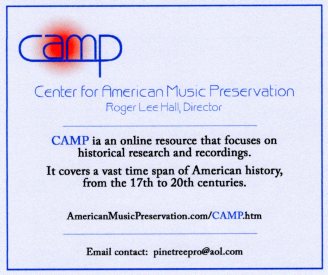

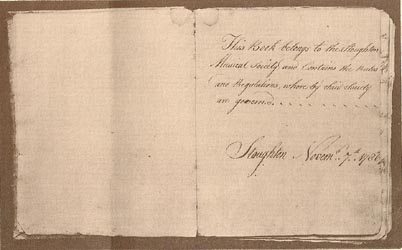
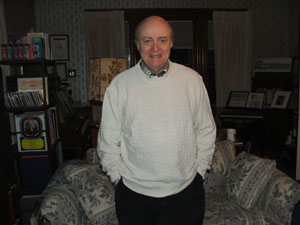


.jpg)




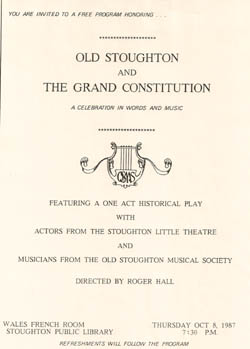


.jpg)



















 On April 28, Roger Hall discussed and played a string quartet by E.A. Jones which was first performed at the home of Isabella Stewart Gardner in Boston in 1889. This discussion was part of the Stoughton Reads Together series about the book, The Gardner Heist: The True Story of the World's Largest Unsolved Art Heist by Ulrich Boser.
On April 28, Roger Hall discussed and played a string quartet by E.A. Jones which was first performed at the home of Isabella Stewart Gardner in Boston in 1889. This discussion was part of the Stoughton Reads Together series about the book, The Gardner Heist: The True Story of the World's Largest Unsolved Art Heist by Ulrich Boser. 

